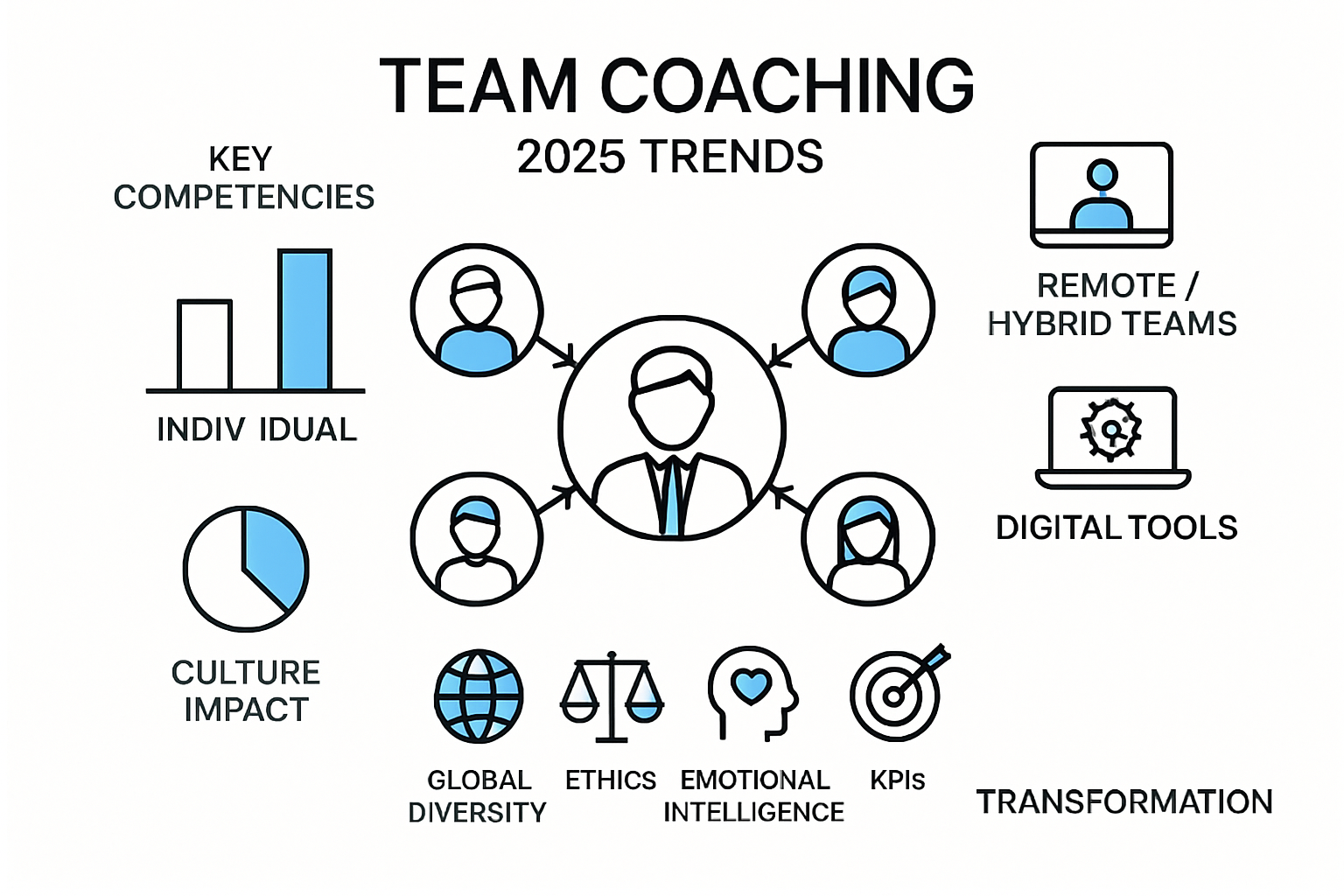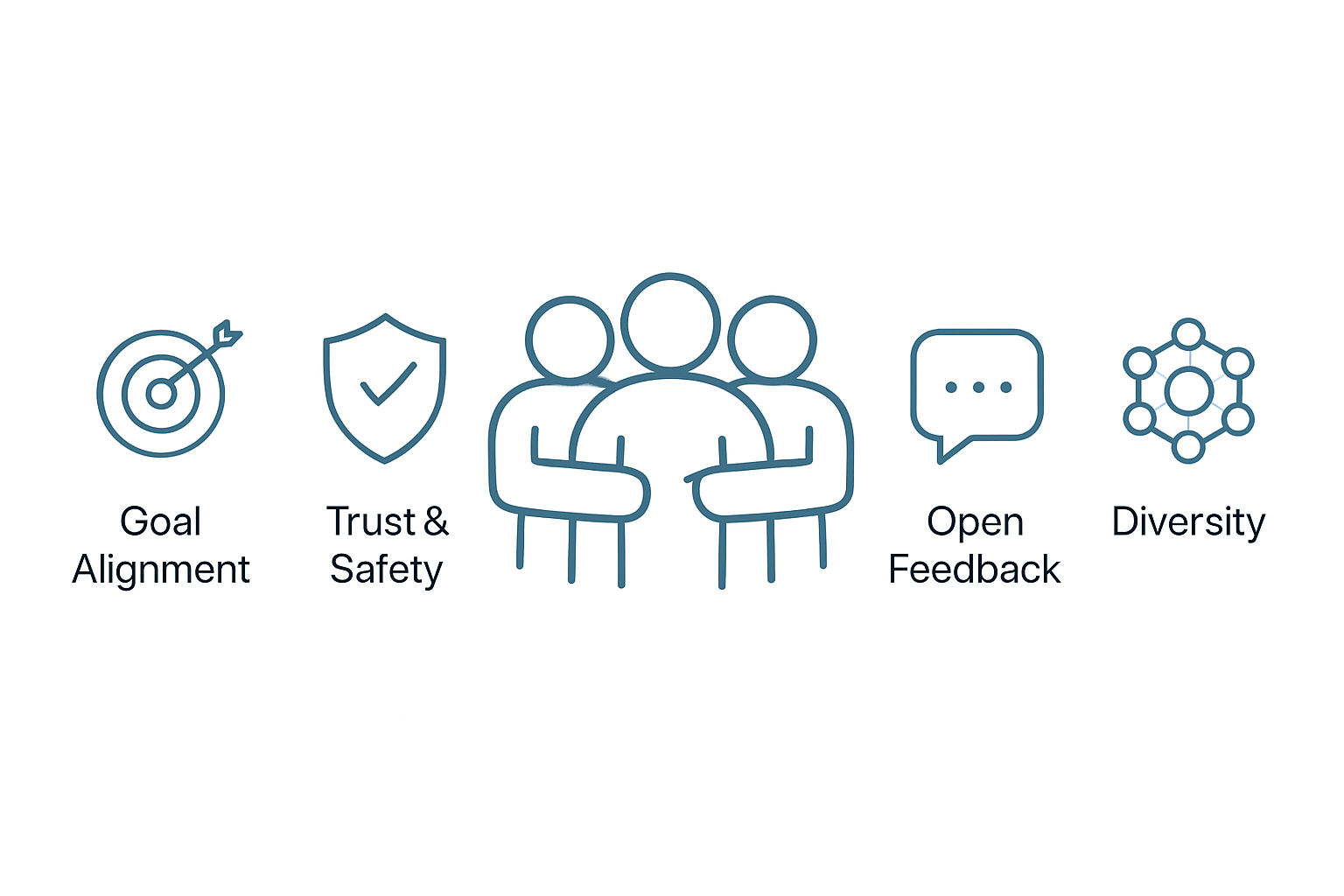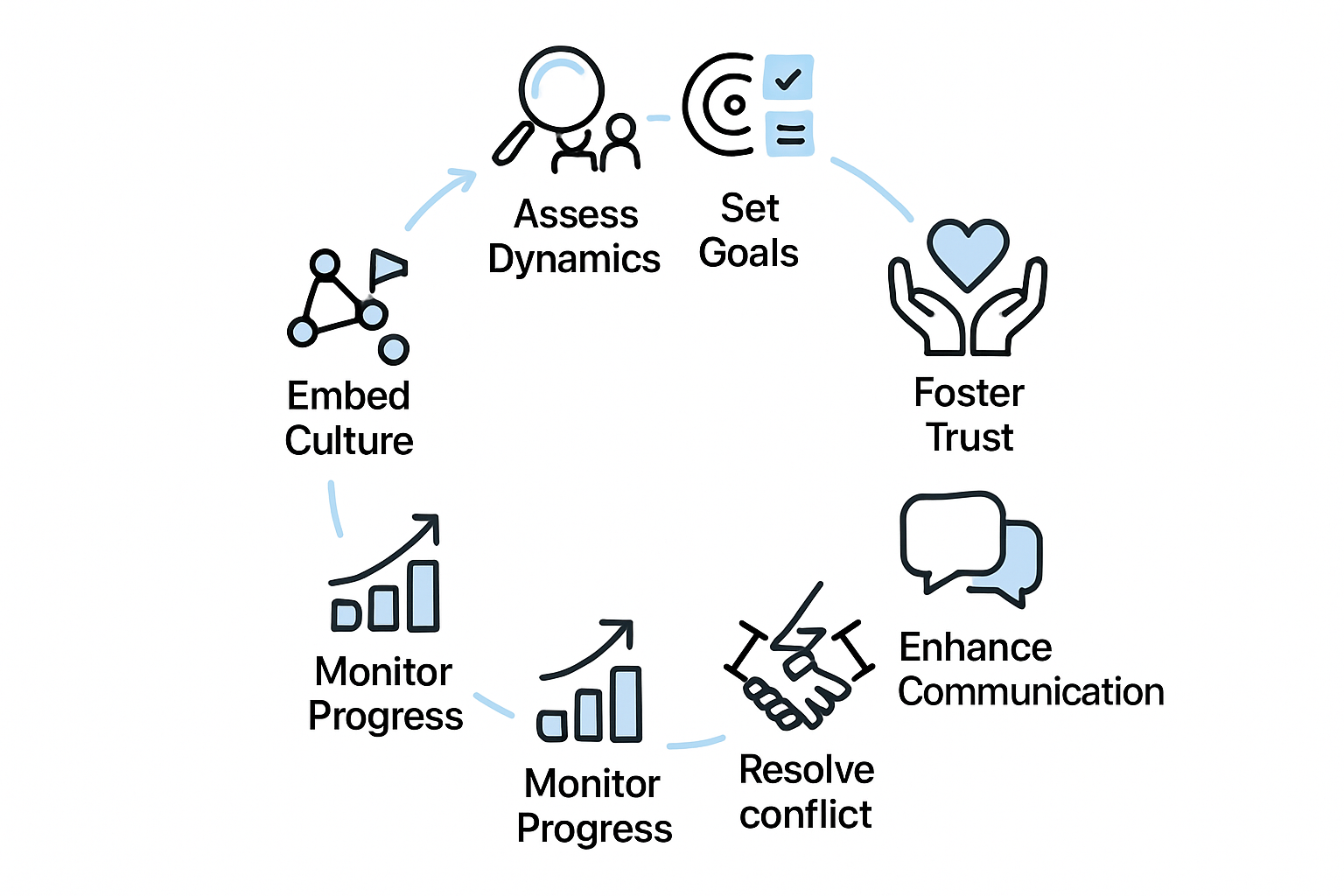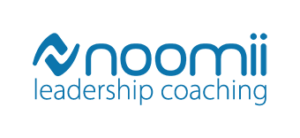Coach Of Team Guide: Essential Strategies For Success 2025
Did you know teams with effective coaching see up to 21% higher profitability? In 2025, the demands on every coach of team continue to grow as teams become more diverse, remote, and interconnected.
Staying ahead means mastering new strategies and insights. This guide is designed to help you, as a coach of team, unlock high performance and lasting success.
Inside, you’ll discover how the coach of team role is evolving, core coaching principles, proven strategies, practical tools, and inspiring real-world examples.
Ready to transform your team’s performance and morale? Dive in and become the standout coach of team your organization needs.
The Evolving Role of the Team Coach in 2025
The landscape for the coach of team is changing rapidly as organizations look to maximize collective performance in a volatile business environment. Team coaching has moved to the forefront, driven by a need to address increasingly complex dynamics. As we look toward 2025, understanding how this role evolves—and what core skills and cultural factors drive success—is essential for every modern coach of team.

The shift from individual to team-centric coaching
The coach of team is experiencing a profound shift from focusing on individuals to embracing the collective power of the group. Organizations are recognizing that high-value outcomes are more often driven by teams than by solo contributors. This change is fueled by trends such as remote and hybrid work, cross-functional collaboration, and growing global diversity.
According to Forbes and Simply.Coach, the adoption of team coaching has surged in the past few years. Fortune 500 companies and government teams are now investing heavily in developing team-centric strategies. For a deeper dive into these changes and the latest methods, explore Team Coaching Best Practices.
Today, the coach of team must be able to facilitate group growth and navigate intricate interpersonal dynamics. As we move into 2025, this evolution is only accelerating.
Key competencies for modern team coaches
To succeed, the modern coach of team must master a diverse set of competencies. Facilitation skills, systems thinking, and effective conflict resolution are now baseline requirements. Emotional intelligence and adaptability are equally vital, as teams become more culturally and geographically diverse.
Technology is changing how coaching is delivered. Digital tools enable real-time feedback, virtual workshops, and data-driven insights. Compliance, governance, and ethical standards are also growing in importance. The coach of team needs to be comfortable integrating these tools and frameworks into their practice, ensuring both effectiveness and integrity.
Impact of organizational culture and leadership trends
Organizational culture shapes how the coach of team approaches their work. A supportive, growth-oriented culture amplifies the impact of coaching, while a rigid or unsupportive environment can slow progress. Leadership buy-in and executive sponsorship are critical for creating lasting change.
Data shows that teams coached within positive cultures report higher performance, better collaboration, and greater retention. The coach of team must understand the unique culture of each organization and adapt their methods accordingly. This ensures that coaching not only aligns with business goals but also enhances team morale.
Real-world example: Team coaching success story
A multinational organization recently embraced a coach of team approach to address persistent silos and low engagement. The coach worked closely with cross-functional teams, using diagnostics to identify friction points and implementing targeted interventions.
Through structured workshops, trust-building exercises, and transparent feedback loops, the team saw significant improvements. Collaboration increased, conflicts were resolved more quickly, and overall engagement soared.
This transformation highlights how the coach of team, equipped with the right strategies, can drive measurable results. When organizations commit to team coaching, they unlock new levels of performance and innovation.
Core Principles of Effective Team Coaching
Unlocking the true value of a coach of team approach starts with mastering core principles that drive high-performing teams. These principles act as the foundation for consistent results and a thriving, collaborative culture.

Aligning individual and collective goals
A great coach of team knows high performance begins when personal ambitions align with team objectives. Friction often arises when these goals diverge, so clarity is essential. Use frameworks like OKRs or SMART to set shared priorities and foster accountability.
Techniques include vision workshops and transparent goal-mapping sessions. Leveraging Team Alignment Strategies can help create a culture where every member sees their impact on the team's mission.
When alignment is achieved, motivation rises, and teams move in unison toward success.
Building trust and psychological safety
Trust forms the backbone of every successful coach of team strategy. Without psychological safety, innovation stalls and communication breaks down. Coaches should cultivate safe spaces using ground rules, regular check-ins, and open forums.
Practical tools like trust-building exercises and candid feedback rituals help teams address toxic patterns early. According to research, teams with high psychological safety consistently outperform their peers and adapt faster to change.
The coach of team must model vulnerability and encourage risk-taking, ensuring every voice is valued.
Systems thinking and organizational context
A coach of team must look beyond the individuals, viewing the team as part of a larger ecosystem. Systems thinking helps identify how team dynamics are influenced by company structures, processes, and culture.
Adapting coaching for remote, global, or cross-functional teams is critical. This might mean tweaking workflows or communication tools to fit unique contexts.
By considering these broader factors, the coach of team ensures interventions are relevant, sustainable, and fully integrated into organizational life.
Facilitating open communication and feedback
Open dialogue is non-negotiable for a coach of team aiming to build transparency and learning. Effective feedback loops, such as retrospectives or 360-degree reviews, allow honest conversations and rapid course correction.
Coaches should establish rituals—like weekly check-ins or after-action reviews—to keep lines of communication clear. These tools empower team members to share insights, celebrate progress, and address challenges constructively.
A coach of team who champions feedback helps teams continuously evolve and maintain high engagement.
Navigating conflict and diversity
Conflict is inevitable, but a skilled coach of team turns it into a catalyst for innovation. Embracing diverse perspectives leads to stronger solutions and higher creativity.
Approaches such as structured debates, mediation, and inclusion training help teams resolve issues before they escalate. The coach of team’s role is to ensure differences become strengths, not sources of division.
Study after study shows diverse teams with expert coaching deliver superior results and drive continuous improvement.
Step-by-Step Guide: Essential Strategies for Team Coaching Success
Unlocking the power of a high-performing team is a journey, not a one-time event. As a coach of team, you play a pivotal role in guiding your team through structured, practical steps that drive sustainable results. Below is a proven, actionable framework to elevate your coaching impact in 2025.

Step 1: Assess team dynamics and readiness
Every successful coach of team knows that understanding your team’s current state is essential. Start with diagnostic assessments such as anonymous surveys, one-on-one interviews, or 360-degree feedback. These tools reveal strengths, hidden barriers, and behavioral patterns.
- Use digital assessment platforms for real-time insights.
- Ask open-ended questions to uncover unspoken issues.
- Review past performance and team sentiment data.
A comprehensive assessment helps you tailor your coaching approach to your team’s unique needs.
Step 2: Set clear, measurable goals
Once you have a clear picture, co-create objectives that align with organizational priorities. As a coach of team, facilitate workshops to define SMART goals or OKRs that foster clarity and accountability.
- Use collaborative sessions to ensure buy-in from all members.
- Break down large goals into achievable milestones.
- Document objectives and regularly revisit them.
Research shows that teams with defined goals are twice as likely to achieve desired outcomes. For more actionable strategies, see Effective Coaching Strategies to Enhance Team Performance.
Step 3: Foster trust and psychological safety
Trust is the foundation for any coach of team aiming for lasting results. Facilitate trust-building activities and create safe spaces for open dialogue. Model vulnerability and encourage inclusive participation.
- Host regular check-ins to discuss challenges without judgment.
- Use trust-building exercises or workshops.
- Address concerns promptly to prevent issues from festering.
When trust and psychological safety are present, teams innovate and collaborate more effectively.
Step 4: Enhance communication and collaboration
A strong coach of team ensures that communication flows freely. Implement regular check-ins, structured meetings, and leverage digital tools like Slack, Zoom, or Miro for seamless collaboration.
- Set clear agendas and action items for every meeting.
- Encourage active listening and equal participation.
- Use visual collaboration tools for brainstorming.
Addressing silos and promoting cross-functional dialogue keeps everyone aligned and engaged.
Step 5: Address and resolve conflicts constructively
Conflicts are inevitable, but a skilled coach of team turns them into growth opportunities. Establish ground rules for healthy debates and use mediation techniques when needed.
- Set expectations for respectful disagreement.
- Use third-party facilitators if conflicts escalate.
- Debrief after conflicts to extract learning points.
Turning recurring conflicts into lessons builds resilience and strengthens team bonds.
Step 6: Monitor progress and adapt coaching interventions
Continuous improvement is key for every coach of team. Track key performance indicators (KPIs), engagement metrics, and team sentiment regularly.
- Use digital dashboards to visualize progress.
- Collect feedback frequently and adjust strategies as needed.
- Celebrate short-term wins to maintain momentum.
An adaptive approach ensures that your coaching remains relevant and impactful.
Step 7: Sustain momentum and embed coaching culture
To truly make an impact, a coach of team must integrate coaching practices into daily workflows. Develop internal champions and peer-coaching networks to spread the culture.
- Encourage team members to support each other’s growth.
- Create rituals or routines that reinforce coaching values.
- Recognize and reward teams that embody the coaching mindset.
Organizations with embedded coaching cultures consistently see higher retention and innovation rates.
Techniques and Tools for High-Impact Team Coaching
Unlocking the full value of a coach of team requires leveraging proven techniques and modern tools. High-impact coaching is about more than inspiration; it’s about embedding habits, feedback, and collaboration into daily practice. Below are the essential methods that set successful teams apart.
Active listening and structured feedback
Active listening is at the heart of every effective coach of team. It means not just hearing, but truly understanding and validating each team member’s input. Teach your team how to listen without judgment, paraphrase for clarity, and ask probing questions.
Implement structured feedback rituals such as retrospectives and after-action reviews. These routines help build trust and transparency. For in-depth strategies on building trust, explore How to Rebuild Team Trust for practical ideas you can apply immediately.
- Practice reflective listening in meetings.
- Use feedback templates for consistency.
- Rotate facilitators to keep sessions fresh.
By mastering these basics, you create a safe environment where honest conversations drive growth.
Team assessments and diagnostics
A coach of team relies on data to understand group dynamics. Use tools like 360-degree feedback, DiSC, MBTI, and quick pulse surveys to gather actionable insights. These diagnostics reveal strengths, blind spots, and underlying patterns.
- Schedule regular assessments to track progress.
- Analyze results together to encourage ownership.
- Use findings to tailor coaching interventions.
Teams using diagnostics report greater clarity and satisfaction. This data-driven approach ensures your interventions are always relevant and impactful.
Team-building and experiential learning activities
Building strong bonds is essential for any coach of team aiming for lasting results. Facilitate workshops, simulations, and team challenges to foster collaboration and trust. Experiential learning accelerates behavioral change far more than lectures or slides.
- Organize problem-solving exercises.
- Run role-play scenarios for real-world practice.
- Plan offsite retreats or virtual team-building events.
These activities create shared experiences, break down barriers, and turn abstract principles into daily habits.
Leveraging digital coaching platforms
Modern teams are often distributed, making digital tools indispensable for a coach of team. Platforms like Slack, Zoom, and Miro streamline communication, document progress, and enable remote coaching at scale.
- Use digital scheduling for regular check-ins.
- Track goals and feedback in one place.
- Analyze engagement metrics with integrated dashboards.
Digital platforms offer scalability and real-time insights, helping you keep every team member engaged, wherever they are.
How Noomii Corporate Leadership Program Accelerates Team Coaching Success
The Noomii program equips any coach of team with evidence-based diagnostics, precision coach matching, and tailored intervention plans. Noomii’s approach aligns team and organizational goals, ensuring measurable improvement in engagement, compliance, and leadership effectiveness.

- Benefit from data-driven diagnostics.
- Match with specialized coaches for your unique needs.
- Track progress with clear, actionable metrics.
Leading organizations trust Noomii to deliver scalable, results-driven coaching that transforms teams from within.
Measuring Success: KPIs and ROI in Team Coaching
Defining and tracking success is crucial for any coach of team aiming to drive real impact. In 2025, organizations expect more than anecdotal outcomes—they want hard numbers and evidence of value. That’s why measuring the right KPIs and demonstrating true ROI has become a core competency for every effective coach of team.
Defining success metrics for team coaching
Success for a coach of team starts with clear, relevant metrics. The most impactful KPIs include collaboration scores, engagement levels, goal attainment rates, retention statistics, and innovation outputs.
Here’s a quick overview:
| KPI | What It Measures |
|---|---|
| Collaboration | Teamwork, synergy |
| Engagement | Commitment, participation |
| Goal Attainment | Progress, achievement |
| Retention | Staff turnover, loyalty |
| Innovation | New ideas, improvements |
Behavioral and cultural health indicators, such as psychological safety and feedback quality, also matter. Linking these KPIs directly to organizational objectives ensures that every coach of team can show the tangible impact of their work.
Tracking progress and demonstrating ROI
Ongoing measurement is essential for any coach of team to prove value. Digital dashboards and analytics tools make it easy to monitor short-term wins and long-term shifts. For example, organizations that systematically track coaching ROI have reported returns of up to 5x their investment.
To dive deeper into methods and best practices, check out Measuring Team Coaching ROI for practical tips and case examples.
Regular reporting of both quantitative and qualitative results helps build credibility and justifies ongoing investment in team coaching programs.
Case study: ROI of team coaching in a Fortune 500 company
Consider a Fortune 500 company experiencing low engagement and high turnover. By implementing a structured coach of team program, the organization identified root causes, set measurable goals, and tracked progress.
Within a year, retention rates improved, team performance rose, and the ROI was clear. The company reported increased productivity, stronger collaboration, and a culture shift toward continuous improvement—all directly linked to the coach of team initiative.
Continuous improvement and scaling success
The best coach of team knows that measurement isn’t a one-time task. Using feedback and real-time data, they refine their approaches and scale successful strategies across departments.
Organizations that embed these practices see compounding benefits: higher retention, more innovation, and a coaching culture that supports sustained growth. By anchoring decisions in data, every coach of team can help their teams—and their company—achieve lasting success.

Leave a Reply
Want to join the discussion?Feel free to contribute!